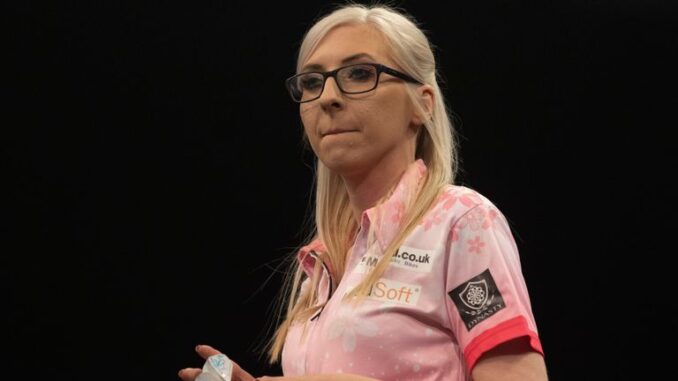
Fallon Sherrock Opens Up About the ‘Hate’ She Faces from Fellow Players: A Deep Dive into the Challenges of Being a Trailblazer in Darts
Fallon Sherrock, often referred to as the “Queen of the Palace,” has made history in the world of darts. As the first woman to win a match at the PDC (Professional Darts Corporation) World Championship, she has become an icon in the sport, breaking barriers and paving the way for more female participation in a traditionally male-dominated arena. However, with this groundbreaking success has come an unfortunate downside: Sherrock has recently revealed that she faces significant “hate” from some of her fellow professional players, describing the environment as anything but welcoming.

In an interview that has sparked widespread conversation, Sherrock opened up about the hostility she experiences, shedding light on the darker side of her rise to fame. While she has been celebrated by fans around the world for her achievements, her male counterparts in the sport have not always been as supportive. According to Sherrock, the success that has brought her global recognition has also made her a target of jealousy and resentment within the professional darts community.
Fallon Sherrock’s journey to becoming one of the most recognizable faces in darts began in earnest at the 2020 PDC World Championship. It was during this tournament that she achieved what no woman had done before: she defeated a male player, Ted Evetts, in the first round, and then followed up this historic win by beating Mensur Suljović in the second round. Her victories were monumental, not only because they were unprecedented but also because they symbolized a significant breakthrough for women in a sport that had long been dominated by men.
Sherrock’s success at the World Championship was met with widespread acclaim. She became an overnight sensation, with fans around the world hailing her as a trailblazer for women in sports. Her achievements were celebrated in the media, and she quickly became a role model for aspiring female darts players. Sherrock’s rise was seen as a turning point, inspiring more women to take up darts and pursue it at a competitive level.
However, as with many trailblazers, Sherrock’s journey has not been without its challenges. While her achievements have been celebrated by fans and the broader public, the reaction from within the darts community has been more complicated. In her recent revelations, Sherrock has highlighted the hostility she faces from some of her fellow players—hostility that stems, she believes, from a combination of jealousy, resentment, and the disruption of the status quo.
Breaking into a male-dominated sport is never easy, and the world of professional darts is no exception. For decades, darts has been a sport where male players have largely occupied the limelight, with women often relegated to the sidelines or given limited opportunities to compete on the same stage. Sherrock’s success has challenged this dynamic, forcing the darts community to confront questions about gender equality, inclusivity, and the future of the sport.
Unfortunately, not everyone within the professional darts circuit has embraced these changes. According to Sherrock, some of her male colleagues have reacted to her success with negativity, making it clear that they do not welcome her presence in the same competitive spaces. She has spoken about receiving “hate” from other players, describing the environment as “not nice” and highlighting the difficulties of being a woman in a sport that has traditionally excluded women from its highest levels of competition.
The hostility that Sherrock faces is indicative of a broader issue within sports and society as a whole: the resistance to change and the difficulties that arise when established norms are challenged. In many ways, Sherrock’s experience reflects the struggles of women in various fields who break through barriers, only to face backlash from those who feel threatened by their success.
For Sherrock, the “hate” she encounters has made her professional environment challenging. Competing at the highest level requires focus, confidence, and mental strength—all of which can be undermined by a toxic atmosphere. The hostility from fellow players, whether it comes in the form of overt aggression or more subtle forms of exclusion and disrespect, can take a toll on an athlete’s well-being and performance.
Moreover, this negativity highlights the broader cultural issues within the sport of darts. The fact that a female player who has achieved so much can still be met with hostility from her peers raises important questions about the inclusivity of the sport and the attitudes that persist within its ranks. It suggests that, despite the progress made in recent years, there is still much work to be done to create an environment where all players, regardless of gender, feel respected and supported.
Sherrock’s experience is not just a personal issue; it is a reflection of the ongoing struggle for gender equality in sports. While strides have been made in recent years to increase the visibility and opportunities for women in sports, there remains a significant gap in terms of acceptance, recognition, and respect.
In darts, this gap is particularly pronounced. Historically, the sport has been dominated by men, with women often confined to separate tournaments or lower-profile events. Sherrock’s success at the PDC World Championship was a major step forward, but the reaction she has received from some of her peers shows that the sport still has a long way to go in terms of fully embracing female players at the highest levels.
The hostility Sherrock faces also underscores the importance of creating a more inclusive culture within sports. It is not enough to simply open the door for women to compete; there must also be a concerted effort to ensure that they are welcomed, respected, and treated as equals. This requires not only changes in policy and structure but also a shift in attitudes among players, officials, and fans.
While Sherrock has faced significant challenges from within the darts community, she has also received an outpouring of support from fans and allies around the world. Many have taken to social media to express their admiration for her achievements and their disgust at the hostility she has encountered. This support is crucial, not only for Sherrock’s own morale but also for sending a message to the broader darts community that such behavior is unacceptable.
The role of fans and allies in challenging toxic behavior and supporting female athletes cannot be overstated. By standing up against hostility and advocating for a more inclusive environment, fans can help to create a culture where all players feel valued and respected. This kind of solidarity is essential for driving change, both within darts and in sports more broadly.
Moreover, the support of other players—both male and female—can be a powerful force in combating negativity and fostering a more positive environment. When high-profile players speak out against hostility and stand in solidarity with their female colleagues, it sends a strong message that such behavior will not be tolerated.
Despite the challenges she faces, Fallon Sherrock’s impact on the world of darts is undeniable. Her achievements have inspired countless women and girls to take up the sport, proving that they too can compete at the highest levels. Sherrock has become a symbol of perseverance and strength, showing that it is possible to overcome adversity and break through barriers, even in the face of significant resistance.
Looking ahead, Sherrock’s legacy will likely be defined not just by her historic victories but also by her role in pushing the sport of darts toward greater inclusivity and equality. By speaking out about the hostility she faces, she is helping to raise awareness of the issues that still exist within the sport and is paving the way for future generations of female players.
In the years to come, Sherrock’s story may well be seen as a turning point—a moment when the sport of darts began to truly embrace gender equality and create a more welcoming environment for all players. Her courage in the face of adversity, both on and off the oche, serves as a powerful reminder of the importance of standing up for what is right and challenging the status quo.
Fallon Sherrock’s revelations about the hostility she faces from fellow players are a stark reminder of the challenges that come with being a trailblazer. While her achievements have been celebrated by many, they have also made her a target for those who feel threatened by the changes she represents. This hostility is not just a personal issue for Sherrock; it is indicative of the broader struggles for gender equality in sports.
The darts community—and the world of sports more broadly—must take Sherrock’s experiences seriously and work to create a more inclusive and supportive environment for all players. This requires not only addressing the behavior of individual players but also challenging the cultural norms and attitudes that allow such behavior to persist.
Fallon Sherrock’s story is one of triumph and resilience, but it is also a call to action. As fans, players, and officials, we all have a role to play in making sports a place where everyone can compete on an equal footing, free from hostility and discrimination. By standing with Sherrock and supporting her in her journey, we can help to create a future where the next generation of female players will not have to face the same challenges she has endured.
Leave a Reply